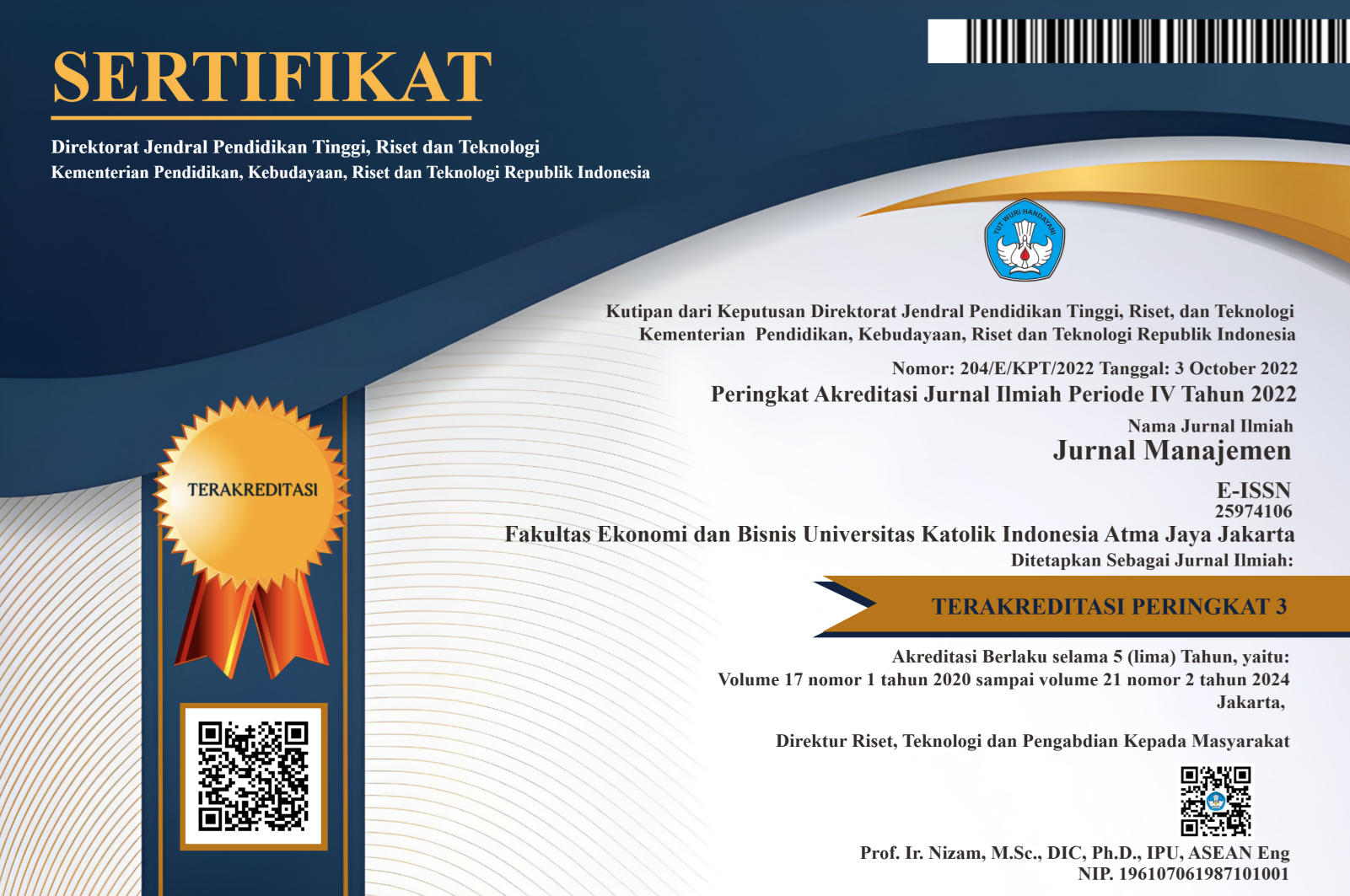MENGULIK PERAN JOB INSECURITY YANG MEMPENGARUHI EMOTIONAL EXHAUSTIONAL PADA GEN Z DI DUNIA KERJA YANG DIMEDIASI OLEH DETERMINAN ROLE AMBIGUITY
DOI:
https://doi.org/10.25170/jm.v20i2.4796Keywords:
Job Insecurity, Determinan Role Ambiguity, Emotional ExhaustionalAbstract
Emotional exhaustion is individual fatigue related to personal feelings and depletion of emotional resources, which refers to excessive emotional feelings due to contact with other people or work. Emotional exhaustion can be influenced by factors including job insecurity and role ambiguity. This research aims to determine the influence of job insecurity through role ambiguity which consists of unclear rules, vague responsibilities, vague expectations on emotional exhaustion at work. The sample in this research was Gen Z who worked part time, full time or freelance, amounting to 200 respondents. The data collection technique uses a list of questions such as a questionnaire and the data analysis technique uses Partial Least Square (SmartPls) to test the ten hypotheses proposed in this research. The research results show that job insecurity directly and indirectly through the determinants of role ambiguity has a positive and significant influence on emotional exhaustion.
References
Alifandi, Y. 2016. Kelelahan Emosi (Emotional exhaustion) Pada Mahasiswa Yang Bekerja Paruh Waktu (Studi Pada Mahasiswa Universitas Negeri Semarang Yang Bekerja Paruh Waktu). Universitas Negeri Semarang.
Bulan.2022. Pengaruh konflik dan Ambiguitas Peran terhadap kepuasan Kerja yang dimediasi oleh Kelelahan Emosional. Jurnal Dialektika. Vol 7 (1), 73-86
Hafidz, Luqman. 2022. Analisis Tingkat Emosi Generasi Z di Dunia Kerja. URL:https://talentics.id/blog/talentics/case-study/analisis-emosi. (Diakses tanggal 25 Februari 2023)
Hair, J. F., Anderson, R. E., Babin, B. J., & Black, W. C. (2014). Multivariate data analysis: A global perspective (Vol. 7): Upper Saddle River, NJ: Pearson
Kasali, R. (2018). Strawberry Generation. Yogyakarta: Mizan.
Kompas. 2017. Setelah Generasi Y, Kini Generasi Z Terbukti Paling Tidak Setia diKantor.URL:.https://biz.kompas.com/read/2017/04/17/085547028/setelah.-generasi-ykini.generasi.z.terbukti.paling.tidak.setia.di.kantor (Diakses tanggal 25 Februari 2023)
Lestari, D. 2022. Pengaruh Role ambiguity Dan Role Conflict Terhadap Emotional exhaustion Dan Job Satisfaction (Studi Pada Mahasiswa Yang Bekerja Di DKI Jakarta) (Doctoral dissertation, STIE Indonesia Banking School).
Nurahman.2022. Nah Lho! Milenial dan Gen Z Ramai-ramai Resign Karena Tempat Kerja Toxic. URL: https://finance.detik.com/berita-ekonomi-bisnis/d-6126304/nah-lho-milenial-dan-gen-z-ramai-ramai-resign-karena-tempat kerja-toxic. (Diakses tanggal 1 maret 2023).
Partina, A. (2013). Role ambiguity and role conflict sebagai anteseden dari job insecurity pada contingent worker. Jurnal Perilaku dan Strategi Bisnis, 1(1). Jurnal perilaku dan srtategi Bisnis.
Patria, R., DP, E. N., & Rusli, R. (2016). Pengaruh konflik peran dan ambiguitas peran terhadap kinerja auditor dengan kecerdasan emosional sebagai variabel moderasi (studi empiris pada KAP di Pekanbaru Padang dan Batam) (Doctoral dissertation, Riau University).
Rasip, A., Kurniawan, H., & Syahrina, I. A. 2020. Hubungan Antara Job insecurity Dengan Burnout Pada Karyawan Outsourching Fifgroup Cabang Padang. Psyche 165 Journal, 140-146.
Suprasto,, Widhiyani,., & Suryanawa, I. K. .2017. Ability of religiosity and emotional intelligence to moderate the effect of role conflict, role ambiguity, role overload, and job insecurity on burnout of tax consultants in Bali province. Journal of Finance and Accounting, 8(18), 7-15.
Yustina, A. I., Satrio, R. A. B., & Shaleh, K. .2021. Negative Effect of Job insecurity in the Relation between Ethical Leadership and Emotional exhaustion in Auditor. JRAK: Jurnal Riset Akuntansi dan Komputerisasi Akuntansi, 12(1), 91-109.
Downloads
Published
Issue
Section
License
Copyright (c) 2024 Nurhasanah, Mustika Ratu, Sulistyo Utami, Kartin Aprianti

This work is licensed under a Creative Commons Attribution-NonCommercial-ShareAlike 4.0 International License.
Authors who publish with this journal agree to the following terms:
Authors retain copyright and grant the journal right of first publication with the work simultaneously licensed under a Creative Commons Attribution-NonCommercial-ShareAlike License that allows others to share the work with an acknowledgement of the work's authorship and initial publication in this journal.
Authors are able to enter into separate, additional contractual arrangements for the non-exclusive distribution of the journal's published version of the work (e.g., post it to an institutional repository or publish it in a book), with an acknowledgement of its initial publication in this journal.
Authors are permitted and encouraged to post their work online (e.g., in institutional repositories or on their website) prior to and during the submission process, as it can lead to productive exchanges, as well as earlier and greater citation of published work (See the Effect of Open Access).












